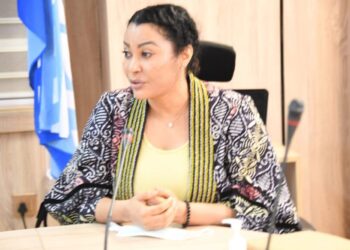International Labour Organization (ILO) in collaboration with The Small and Medium Enterprises Development Agency of Nigeria (SMEDAN), and various stakeholders organized a one-day validation workshop to present a roadmap on the implementation of timelines aimed at addressing challenges and promoting women’s entrepreneurship development.
Nairametrics learns that the roadmap was developed based on assessments conducted outlining six pillars and a 3-year plan (2023-2026) to enhance conditions for women entrepreneurs in Nigeria.
The workshop involved over 50 organizations, and stakeholders contributed valuable insights to refine the roadmap.
The document emphasizes stakeholder ownership and commitment, calling for the establishment of an Implementation Monitoring Team to ensure effective execution, coordination, oversight, and reporting for enhanced transparency and accountability.
This article aims to provide a breakdown of the roadmap categorized into 6 strategic pillars discussing goals, relevant stakeholders, plans for each year and action plan.
Pillar 1: Improving access to gender-sensitive business development support (BDS) for women entrepreneurs in Nigeria
This Pillar is focused on women’s entrepreneurship development, formalization, and sustained growth over the specified timeline (2023-2026).
Despite positive trends in women’s entrepreneurship across various sectors, challenges persist, including limited access to BDS, inadequate training, and mentorship opportunities.
- Stakeholders proposed a 3-year plan to address these issues, involving key actors such as SMEDAN, NDE, NECA, FIWON, AEA, NCWD, and Hasal Microfinance Bank.
- The strategic actions for each year include comprehensive training programs, public procurement capacity strengthening, mentorship networks, sectoral workshops, networking events, ecosystem strengthening, best practice dissemination, and plans for future roadmaps.
Pillar 2: Improving women entrepreneurs’ access to gender-sensitive financial services in Nigeria
The goal of this Pillar is to ensure equitable access to finance and resources for women entrepreneurs, addressing gaps and promoting financial inclusion.
Despite progress, challenges such as limited awareness of available programs, lack of collateral, and discriminatory lending practices persist.
Microfinance institutions, government programs, and venture capital have provided accessible funding options, but barriers remain, including inadequate gender data.
- Key actors, including NECA, BOA, BOI, CBN, LSETF, SMEDAN, and others, plan strategic actions over 3 years (2023-2026).
- The foundational development involves needs assessments, market research, gender data initiatives, and financial literacy workshops.
- Innovative solutions include tailored financial products, awareness creation, digital platforms, and peer learning networks.
- The sustainability and expansion phase focuses on partnership engagement, continued awareness campaigns, and advanced capacity-building for women entrepreneurs.
Pillar 3: Establishing a gender-sensitive legal and regulatory system in Nigeria to advance women’s economic empowerment and enterprise development
The overall goal is to create an enabling legal and regulatory environment that supports the formalisation and development of women-owned businesses in Nigeria.
Existing policies, such as the National Gender Policy, MSME Policy, and Financial Inclusion Strategy, emphasize gender equality and provide a framework for women’s participation in economic activities.
Amendments to the Companies and Allied Matters Act in 2020 introduced the digitalization of business registration processes, aiming to simplify and expedite formalisation, which is particularly beneficial for women entrepreneurs facing socio-cultural challenges.
Strategic actions are outlined for 3 years (2023-2026), involving key actors such as CAC, JTB, NAFDAC, NHIA, NEPC, BPP, SMEDAN, and SON.
- In Year 1, the focus is on a legal landscape assessment, stakeholder consultations, legislative reforms, training workshops, and the creation of an online resource hub.
- Year 2 emphasizes policy reform, sensitization on business formalization, collaborative efforts, and innovative strategies to improve formalization rates.
- It includes the establishment of one-stop shops, helplines for formalization, review of business licensing bodies, and policy proposals for gender-inclusive policies and tax reforms.
- Year 3 concentrates on implementing legislative reforms, simplifying laws and regulations, establishing business estates, and database management to track women entrepreneurs formalizing their enterprises.
Pillar 4: Enhance the representation and participation of women entrepreneurs in business and sector membership associations in Nigeria
The key actors in this pillar include organizations like PAWEN, WIMBIZ, NNEW, WOCON, NLC, FIWON, Development Research and Projects Centre, and MAN. The strategic actions span 3 years (2023-2026).
- In Year 1, the focus is on a baseline assessment of representation and engagement, stakeholder engagement, and collaboration with NGOs to increase women entrepreneurs’ enrollment with business associations.
- Year 2 involves capacity-building through workshops on leadership skills, advocacy, negotiation, and effective communication. It encourages women-owned enterprises to join relevant associations at different formalization stages, providing mentorship programs for leadership development.
- In Year 3, the emphasis is on advocacy campaigns to address gender-specific challenges, annual award ceremonies, regular progress assessments, and networking events to facilitate connections and knowledge exchange among women entrepreneurs.
Pillar 5: Enhancing women entrepreneurs’ access to markets and technology in Nigeria
The goal is to ensure women entrepreneurs continue to benefit from technology, expand their market reach, and contribute to sustainable economic growth.
Technology, including digital platforms and mobile banking, has significantly benefited women entrepreneurs, providing broader access to domestic and international markets. However, challenges such as the digital divide, online security concerns, and the need for digital literacy persist, especially among rural women farmers and those with disabilities.
Key actors include the Bureau of Public Procurement, Federal Ministry of Communication and Digital Economy, Federal Ministry of Information & Culture, FIWON, NITDA, TUC, and MAN.
The strategic actions span 3 years (2023-2026).
- In Year 1, initiatives include clustering informal sector businesses, grassroots sensitization, market analysis, and training on market research, branding, and digital skills.
- Export readiness workshops and technology assessments aim to identify barriers and enhance technological adoption.
- Year 2 focuses on market penetration, technology workshops, and e-commerce development, supporting women entrepreneurs in entering new markets and optimizing digital platforms.
- Progress assessments will be conducted, and policies developed to promote women-owned enterprises’ entry into public procurement.
- Year 3 emphasizes sustainability and growth, including trade missions, promotion of tech entrepreneurship, and training on e-marketing strategies.
Pillar 6: Effective policy leadership and coordination to promote women’s entrepreneurship development (WED) and formalization in Nigeria
According to the roadmap, there is a need to enhance the efficiency of resource utilization and synergy across initiatives and government agencies.
The existing institutional structures responsible for formulating and coordinating development policies in Nigeria work at the federal and state levels.
The key actors include SMEDAN, the Federal Ministry of Labour and Employment, the Federal Ministry of Women Affairs, the Federal Ministry of Trade Industry and Investment, and various state-level ministries. The strategic actions span 3 years (2023-2026).
- In Year 1, the strategy involves conducting stakeholder consultations to identify policy challenges, particularly in rural areas and among people living with disabilities.
- Moving into Year 2, the focus shifts to policy development and advocacy. This includes creating comprehensive policy recommendations, launching advocacy campaigns to raise awareness, and engaging with policymakers to promote gender-sensitive legislation.
- Year 3 emphasizes the implementation and monitoring phase. This includes developing an implementation framework, establishing a coordination mechanism, and providing capacity-building workshops for government officials and stakeholders on gender-responsive policy development and coordination.


























